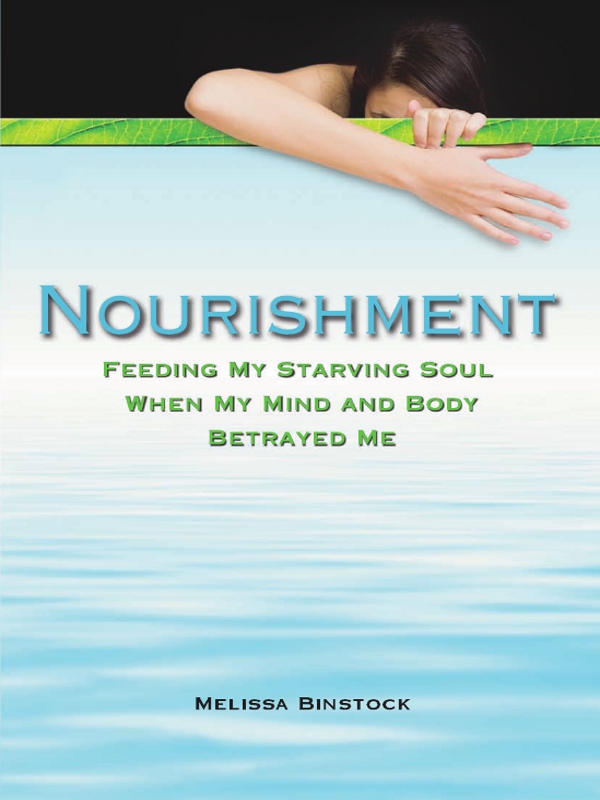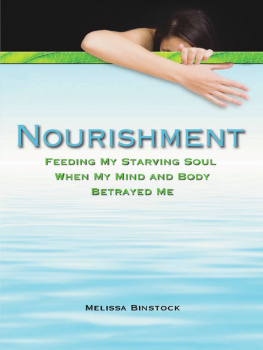
Praise for NOURISHMENT
This extraordinarily well-written autobiography should be a must read for all affected by Tourette and obsessive compulsive disorder as well as those involved in the care of such patients and involved in research into neurobehavioral disorders. The book not only provides personal insights into these disorders but also conveys hope to those touched by neurological and mental illness. Melissas story is compelling and inspirational.
Joseph Jankovic, M.D., Professor of Neurology and Director of
Movement Disorders Clinic at Baylor College of Medicine
Nourishment is a must read for everyone. This autobiography truly shows the power of one persons struggle to embrace these complex psychological and neurological disorders. Melissa writes with such passion that it was difficult putting this book down. I found myself moved by her ability to continue on despite all the setbacks and complications. This book truly inspired me and was at the same time a spiritual experience.
Ira M. Sacker, M.D., Eating Disorders Specialist
and Author of Regaining Your Self and Dying to Be Thin
Melissa Binstock tells a complex story about the intersecting psychological and neurological problems she suffered as a child. I found her story so compelling that I used it in my course on pathography in a doctoral seminar. Parents, children, school teachers, psychologists, psychoanalysts, and professors of education will certainly be interested in the way that this extremely gifted young person worked through her issues.
Dr. Marla Morris, Associate Professor of
Education at Georgia Southern University
(Nourishment) had some elements of my own life, which both terrified me and gave me hope.... (My son) and I are still working on rebuilding a relationship. He saw me as the pill-pusher and also felt unloved and unworthyespecially since I always seemed to be sending him away somewhere.... As (the book) implies, the cure is not so easily reached but is on-going and a matter of degrees. Hurrah on receiving your pretty packagelife!
Cindy Sacks, Executive Assistant
for the Tourette Syndrome Association of Texas
This world needs more real, authentic heroes. Melissa Binstock is one. In Nourishment, she shows all of usregardless of our particular struggles in lifethat hurdles are meant for overcoming and freedom can be chosen in each moment. Thanks, Melissa, for not giving up on yourself and for sharing your experience so that we might not quit either.
Jenni Schaefer, Author of Goodbye Ed,
Hello Me and Life Without Ed
I can truly relate to feeling worthless; feeling unloved by a parent and seeking love and acceptance from another; being tired of feeling sick and in pain; worrying about what others think of me while trying to fit in; experiencing side effects from various antidepressants; and many of the other experiences Melissa went through. Unlike some other books on eating disorders, Nourishment really touched my heart.
Tiffany Salinas, Student
Melissa Binstock takes us on a voyeuristic journey to expose the quiet, controlled silence of young women who suffer the stigma of neurological and psychiatric disorders. This is a gripping ride, and her life experiences illustrate our commonality; we are all forces of spirit, striving to glide over intense, complicated, painful barriers to gain the real prizea joyful life. You will be inspired, changed, humbled, and all the wiser as you, too, come to realize that perfection isnt measured by caloric nourishment but by loving and being loved.
Elizabeth S. Dybell, Ph.D., Clinical Psychologist
NOURISHMENT
FEEDING MY STARVING SOUL WHEN
MY MIND AND BODY BETRAYED ME
MELISSA BINSTOCK

Health Communications, Inc.
Deerfield Beach, Florida
www.hcibooks.com
The Library of Congress has catalogued the printed edition as follows:
Binstock, Melissa.
Nourishment : feeding my starving soul when my mind and body betrayed me/Melissa Binstock.
p. cm.
ISBN-13: 978-0-7573-1542-8
ISBN-10: 0-7573-1542-9
1. Binstock, MelissaMental health. 2. Mentally illBiography. I. Title. [DNLM: 1. Mentally Ill PersonsPersonal Narratives. 2. Anorexia Nervosa Personal Narratives. 3. Attention Deficit Disorder with HyperactivityPersonal Narratives. 4. Learning DisordersPersonal Narratives. 5. Obsessive-Compulsive DisorderPersonal Narratives. 6. Tourette SyndromePersonal Narratives. [WM 40]
RC464.B56A3 2011
362.196890092dc22
[B]
2010039690
2011 Melissa Binstock
eISBN-13: 978-0-7573-9193-4
eISBN-10: 0-7573-9193-1
All rights reserved. Printed in the United States of America. No part of this publication may be reproduced, stored in a retrieval system or transmitted in any form or by any means, electronic, mechanical, photocopying, recording, or otherwise, without the written permission of the publisher.
HCI, its logos, and marks are the trademarks of Health Communications, Inc.
Publisher: Health Communications, Inc.
3201 S.W. 15th Street
Deerfield Beach, FL 33442-8190
Author photo by Mark Katz
Cover design by Lawna Patterson Oldfield
Inside book design and formatting by Dawn Von Strolley Grove
To my loving parents
Cathy and Bob Binstock:
Without your undying care and support,
I know I would not be here today.
Thank you for standing by me
through the years, thank you
for never giving up, and most of all,
thank you for loving me.
CONTENTS
by George S. Glass, M.D.
A s a psychiatrist, a parent, and someone who knows Melissa and her family, I found Nourishment fascinating on many levels. It is a story about the insidious onset of mental illness and the ebb and flow of that disease over time. It is a story about treatment, treatment facilities, and treatment professionals, both good and bad. It is a story about being different and how that differentness is viewed, tolerated, and often abused by others. It is a comment on tolerance; as a society, we often have trouble accepting, making adjustments for, and listening to someone who is a little different even if, or maybe particularly when, that person is a child. It is about life, reality, dealing with the hand that one is dealt, and managing ones expectationsas a child, a parent, or a concerned outsider.
But mostly it is a story about love and hope. Even when Melissas situation seems hopeless, her familys support never waverseven when she shuns them, thinks their support is toxic, and eventually avoids them altogether as her disease progresses. As Melissa takes us along through her ups and downs and the fleeting moments of hope that come crashing down again and again, the reality of the interplay between psychic turmoil, physical illness, and real-life events becomes palpable.
Melissa details the development of her eating disorder from its beginning: a young girls attempt to control something when she feels out of control and is slowly losing what little she has as the disease takes over. That she has been able to heal and write so movingly about that time is a tribute to the fortitude of her desire to move forward in her life and become content.
Melissas story is also a comment on medicine, psychiatry, and the pharmaceutical industry. It is incredible that large pharmaceutical companies help us hope (if not believe) that medicine will fix everything, yet this adolescent patient attempted to identify the destructive effects of many of the medications she was given and no one would listen to her because of her youth. Sadly, Melissa also experienced the art in psychiatrythere is not just one recommended treatment for a problemand her story reflects the lack of accountability that often occurs in all branches of medicine. Therapists, for example, often cannot keep their own agendas and baggage out of their work, and as Melissa details, this negatively affects the weak, needy, and vulnerable who are under their care. That Melissa was able to persist through this process, recognize what did and did not work for her, and then move on is a tribute to her inner strength.
Next page












